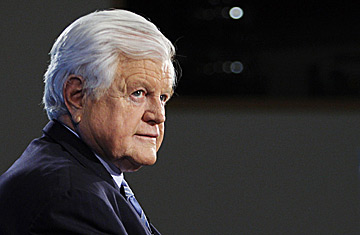
Senator Edward Kennedy
This week I grabbed a few minutes of Senator Ted Kennedy's time on his way for a vote on the Senate floor. I asked him how the presidential candidates who fail in their bid for the White House will handle returning to the Senate — as he did after after his own failed run for the Democratic nomination in 1980.
"There's a transition, obviously, moving from a candidate for the presidency back to the Senate, but I loved the Senate before I ran," Kennedy said, walking slowly through the Capitol building, hunched due to chronic back pain he suffers from a 1964 plane crash. "I came to the Senate at an early age. I always wanted to be in the Senate. I love it now, and so I very quickly adapted to returning to the Senate."
Kennedy, the second-longest serving Senator in office, has, over the years, become an institution on Capitol Hill. Which is why, when word came on a brilliant Saturday morning that Kennedy had been rushed to the hospital after suffering what was initially described as stroke-like symptoms (and later called a seizure), the news hit Washington like a small earthquake.
The reaction was not due to partisan concern — as when South Dakota Senator Tim Johnson was hospitalized with bleeding in the brain, shortly after the Democrats won control of the Senate in 2006 and the party feared losing his seat and control of the Senate. If anything were to happen to Kennedy, his seat would remain securely in Democratic hands, since a temporary replacement would be appointed by Massachusetts' Democratic Governor Deval Patrick until the next elections. The alarm felt by Democrats had little to do with the Senate's balance of power, but rather from contemplating for the first time the vacuum that Kennedy would leave behind.
Visit Kennedy's hideaway office in the Capitol and one can see a photographic guide through his unparalleled family political history: his brothers John and Bobby, nephew John F. Kennedy Jr., his nieces Caroline and California First Lady Maria Shriver. But Ted Kennedy's legacy comes not merely from his family history, but his achievements as one of the greatest legislators of the century. "Kennedy's best years in the Senate came after his presidential run," former Majority Leader Tom Daschle told me later in the week. "The lion that he is today is in part due to his presidential race but even more so due to all of the legislative achievements he's orchestrated in the Senate in the decades since."
Indeed, almost every bipartisan bill in the last seven years has had Kennedy's signature on it, from No Child Left Behind and the Medicare Prescription Drug Program, to pension reform and a collective bargaining bill for first responders passed by the Senate just last week. Kennedy's legislative belief has always been to "never let the perfect be the enemy of the good," as he's said on many occasions. Even with bills that had major flaws, such as immigration reform, he believed it was better to pass something and then work to fix it later on. It was thanks to Kennedy's willingness to work with the other side that the immigration legislation came as close as it did to passage two years in a row. Kennedy "is a legendary lawmaker and I have the highest respect for him," Senator John McCain, the presumptive Republican nominee for President and Kennedy's partner on immigration reform, said in a statement Saturday. "When we have worked together, he has been a skillful, fair and generous partner."
Kennedy, 76, is reportedly resting comfortably at Massachusetts General Hospital in Boston while doctors run tests to determine the problem. A family friend told TIME on Saturday afternoon that he was awake and joking with family — his old self. Senators Barack Obama, Hillary Clinton and dozens of others joined McCain in expressing concern and sending prayers.
His advice for those candidates who will return to the Senate after failed presidential bids? It boils down to following his example. "They'll work their way through it. It's a great opportunity for service," Kennedy said. "You know, running for office is not the purpose of this business; it's service. And there's opportunities for service as President and there's also important opportunities as Senator and I'm sure they relish that." Kennedy certainly has.
